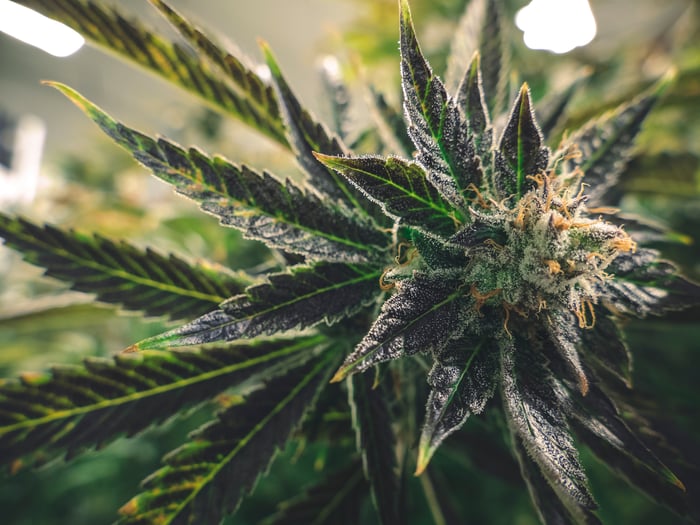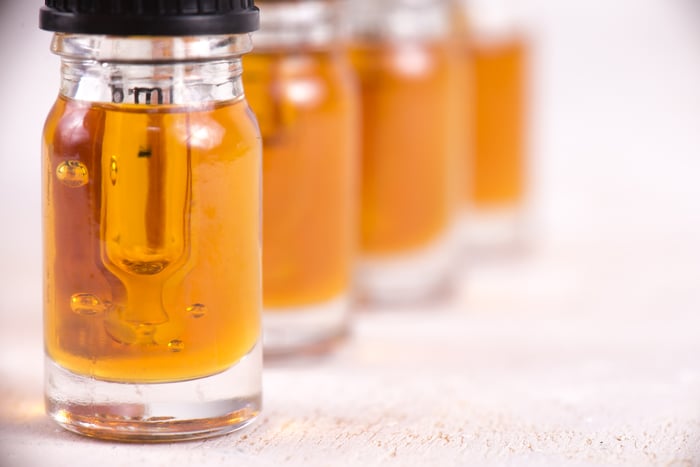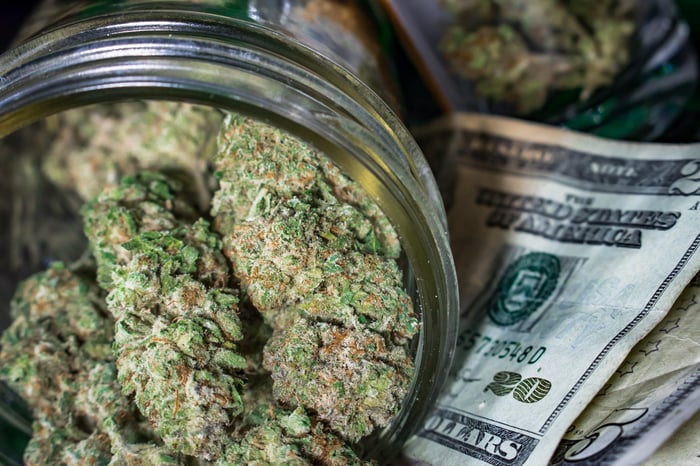With the first half of the year officially coming to a close, we can now say that, despite some hiccups during the second quarter and ongoing supply issues throughout Canada and the U.S., pot stocks "kicked some bud."
For instance, the Horizons Marijuana Life Sciences ETF, a basket fund that holds more than four dozen pot stocks of various weightings, rose 37% in the first six months of 2019. On my personal watchlist, of the 57 pure-play and ancillary marijuana stocks that were publicly listed through the entirety of the first half of 2019, 36 of them, or 63%, headed higher.

Image source: Getty Images.
These pot stocks were unstoppable in the first half of the year
Although many U.S. pot stocks showed weakness in overall performance during the first half of 2019, Canadian marijuana stocks, cannabinoid (CBD)-based drug developers, and anything having to do with CBD derivatives, tended to do quite well. Here's a rundown of the best marijuana stocks through the first six months of the year, which'll be followed by a brief discussion on what's been working for these stocks, and, in some instances, what investors might expect in the second half of the year.
- Zynerba Pharmaceuticals (ZYNE): Up 358%
- Village Farms International (VFF -3.44%): Up 253%
- MediPharm Labs: Up 217%
- Valens GroWorks (VLNS): Up 188%
- Innovative Industrial Properties (IIPR -1.45%): Up 171%
- Shopify: Up 117%
- Flower One Holdings: Up 107%
- Enwave Corp.: Up 87%
- Planet 13 Holdings (PLNH): Up 84%
- OrganiGram Holdings: Up 80%
- GW Pharmaceuticals (GWPH): Up 77%
- Neptune Wellness Solutions (NEPT): Up 71%
Better than one of five of the pot stocks I followed in the first half of the year ended higher by at least 71%, with seven cannabis stocks more than doubling. An additional eight pot stocks, including popular plays Canopy Growth, Aurora Cannabis, Cronos Group, and HEXO, ended the quarter between 50% and 65% higher. So, that's 20 out of 57 cannabis stocks rising by at least 50% in the first half of the year.

Image source: Getty Images.
Extraction! Extraction! Extraction!
If there's one theme that best describes why more companies on this list rocketed higher in the first half of the year, it's the idea of extracting cannabinoids -- more specifically, CBD -- for the creation of derivatives, such as oils, edibles, infused beverages, topicals, tinctures, and so on. As a reminder, CBD, the nonpsychoactive cannabinoid best known for its perceived medical benefit, can be extracted from the cannabis plant or hemp plant, but is often found in abundant amounts in the latter.
Extraction-service providers were easily some of the best performers, with MediPharm Labs, Valens GroWorks, and Neptune Wellness Solutions, among the 12 best marijuana stocks in the first six months. Valens snagged a major partner in April when it signed a two-year agreement to provide resins and distillates to HEXO for an aggregate of 80,000 kilos of cannabis and hemp biomass. But Neptune Wellness one-upped Valens by securing a 120,000 kilo-in-aggregate three-year extraction deal with Tilray on June 7, then a 230,000 kilo-in-aggregate three-year deal with The Green Organic Dutchman just days later.
Growers got in on the action, too. Although Village Farms' joint venture with Emerald Health Therapeutics, known as Pure Sunfarms, is capable of producing at least 150,000 kilos of marijuana per year when at full capacity, it's the company's hemp operations that are creating the buzz. Village Farms aims to plant 920 acres of hemp in 2019 through two joint ventures, and has 5.7 million square feet of greenhouses in West Texas that it could choose to convert to hemp production, now that Texas has passed a law legalizing production of hemp containing less than 0.3% tetrahydrocannabinol (THC), the cannabinoid that gets users high.

Image source: Getty Images.
Cannabinoid drug developers were just what investors ordered
Building on the CBD craze, investors and consumers are really excited to see what pharmaceutical companies may be able to do with cannabinoid-based medicines.
GW Pharmaceuticals, which is behind Epidiolex, the only cannabis-derived drug currently approved by the U.S. Food and Drug Administration (FDA), had an excellent start to the year, in large part because of its first-quarter operating results. After a sluggish first two months of sales, GW Pharmaceuticals' oral CBD-based therapy delivered $33.5 million in sales. Even though GW Pharma is nowhere near profitability yet, the rapid rise in Epidiolex sales suggests strong physician, insurer, and consumer uptake, and that its runway in Dravet syndrome and Lennox-Gastaut syndrome is being realized.
However, the top-performing marijuana stock in the first half of the year was small-cap Zynerba Pharmaceuticals, which is developing a transdermal CBD gel known as Zygel for the treatment of Fragile X syndrome (FXS) and autism spectrum disorders (ASD). In May, Zynerba received a fast-track designation for Zygel in FXS, which could expedite the FDA's review of this experimental therapy following the release of top-line data from the pivotal Connect-FX study in the second half of this year. Then, in June, Zynerba received a boost when it was given a patent for treating ASD using Zygel.

Image source: Planet 13.
Niche companies found their mark
Pot stocks that focus on a very specific area of the cannabis market also tended to do well during the first six months of the year.
For instance, vertically integrated dispensary operator Planet 13 Holdings was one of the top-performing U.S.-focused weed stocks, trailing only Flower One in the return department in its home state of Nevada. Planet 13 is in the midst of building out the Disneyland of cannabis stores in Las Vegas, which when complete will span 112,000 square feet. Since opening 16,200 square feet to the public at the beginning of November, the company's average customer count -- not to be confused with paying customers -- has nearly doubled, with the average ticket rising by more than $10 in seven months.
As someone who's visited the store personally, I can speak of Planet 13's efforts to incorporate technology to ease the buying experience, as well as provide personal budtenders to normalize the cannabis-buying process. If Planet 13 can translate its early Las Vegas success into the 40,000-square-foot dispensary it plans to open in Santa Ana, Calif., this small-cap niche dispensary could prove to be the real deal.

Image source: Getty Images.
Profits matter
Lastly, just in case you'd forgotten, sales and profit results actually matter now that Canada has legalized recreational marijuana and 33 U.S. states have OK'd medical marijuana in some capacity. Though most marijuana stocks have been losing money in recent quarters, cannabis real estate investment trust (REIT) Innovative Industrial Properties has been piling on the profits.
As a cannabis REIT, Innovative Industrial Properties acquires land and facilities for the medical pot industry, then it leases these properties out for an extended period of time. Since the year began, the company has doubled the number of properties in its portfolio to 22 and increased its dividend twice. The payout investors will be receiving in mid-July is 140% higher than what they netted in the year-ago quarter.
While there's plenty of volatility to be had in the marijuana industry, it's also evident that opportunity abounds.





